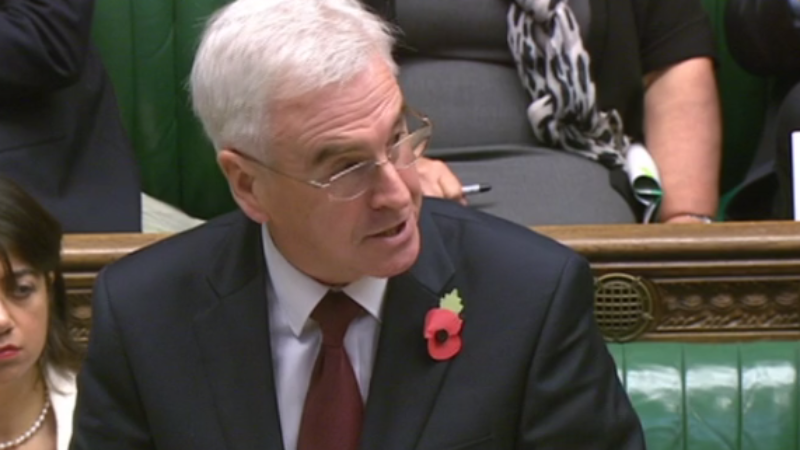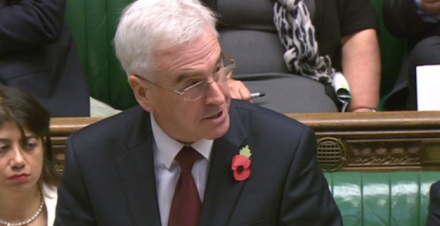

John McDonnell’s speech today was one inspired by Marx – but not in the way you’d expect. The poster boy for radical left-wing thought had a distinct theory of how history worked: one which is applicable to McDonnell’s speech this morning on fiscal credibility.
The dialectic – developed by Hegel before being adopted by Marx – is the theory that opposing ideas develop until they are no longer useful, then structural changes bring about a synthesis of the ideas. Both thesis and antithesis combine to bring about new ideas and possibilities.
McDonnell’s Fiscal Credibility Rule does exactly this. He has a mix of old and new, as well as Old Labour and New Labour, in his ideas.
The challenges of the economy to which we must respond are genuinely new. The economic map is different: low interest rates aren’t stimulating spending, financially-driven capitalism is not expanding and the productivity gap between the UK and the rest of the G7 is getting bigger.
To tackle this, McDonnell envisions a proportionally-decreasing deficit, an entrepreneurial state and a democratic economy. Each are well-researched, credible ideas and all are different to the Conservatives’ policies.
Commentators are right to highlight the similarities between McDonnell’s speech and the policies of Eds Miliband and Balls. They floated the National Investment Bank and were part of the power behind Labour’s fiscal credibility in 1997. Moving away from ‘tax and spend’ was a central part of New Labour’s project, at a time when the two were economic advisers to Gordon Brown.
This isn’t the shock others may think it is: all are in the Labour Party and are likely to agree on a fair number of issues.
There are also some crucial differences. They’re more than a difference in rhetoric and rigour – these are some genuinely new ways of doing politics.
McDonnell – unlike Blair and Brown – does not buy into free market rhetoric. The former Labour Prime Ministers wanted to harness the power of markets for social aims. McDonnell, however, outlined the ways in which the market does not provide us with what we need.
If the flows of capital are going in the wrong direction – allowing large businesses to expand, but preventing small ones from accessing finance – then the forces of the market are fundamentally flawed.
He recognises this problem but does not respond only with state ownership or central planning.
The new ideas – which are genuinely new – are the cornerstone of the new economics and the new politics to match. Democratisation and decentralisation have not been embraced by politicians to this extent before. McDonnell is going beyond a simple regulate-liberalise dichotomy. He is proposing policies that enable innovation: the structure of the economy must be one where those business that can grow are enabled to do so, but those that stifle the growth of others are reigned back. McDonnell has a vision of a good economy, and he is going beyond simple debates of the past in order to realise it.
There is self-conscious economic planning here. McDonnell has a robust account of the failures of the status quo, recommending employee ownership, co-operatives and regionalisation in order to make the economy serve society.
The final novelty of the Chancellor’s approach is one which should not be as unusual as it is. He is one of the few politicians that has a consensus of economists behind him. Labour’s Economic Advisory Committee has some big names on it. Osborne, on the other hand, has been repeatedly criticised by the IMF, the OECD and every economist who has sat in front of the Treasury Select Committee.
Fiscal credibility will be a long fight for Labour, but McDonnell is taking the approach where he may genuinely be right, rather than just popular.




More from LabourList
Government abandons plans to delay 30 local elections in England
‘The cost of living crisis is still Britain’s defining political challenge’
‘Nurses are finally getting the recognition they deserve’